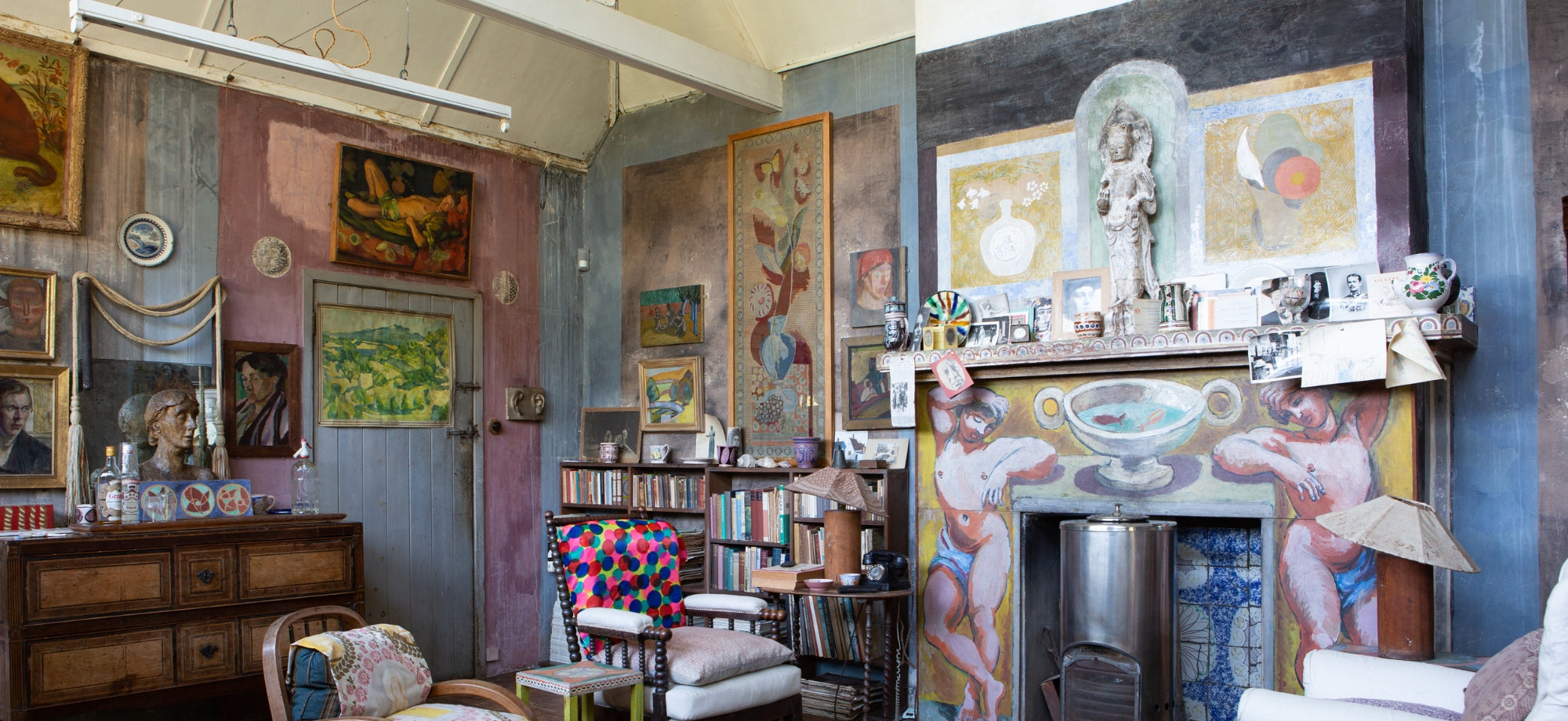
HEAD OF COLLECTIONS, RESEARCH AND EXHIBITIONS
106/ Life at Charleston with Darren Clarke
To coincide with the launch of our new online exhibition ‘In Praise of Home’, we wanted to celebrate one of our favourite creative hubs - Charleston.
A gathering point for some of the 20th century’s most radical artists, writers, and thinkers, they all left their mark in the house through colourful and expressive hand-painted walls, furniture, objets and literature.
Here we have the pleasure of talking with Darren Clarke, the Head of Collections, Research and Exhibitions at The Charleston Trust. Read as he invites us into the home and tells us how the space inspired Vanessa Bell and Duncan Grant, and how it keeps bringing people together through art and creativity.

|
|
Can you start by giving us a snapshot of Charleston’s story?
The modernist home and studio of the painters Vanessa Bell and Duncan Grant, Charleston was a gathering point for some of the 20th century’s most radical artists, writers and thinkers known collectively as the Bloomsbury group. It is where they came together to imagine society differently and has always been a place where art and experimental thinking are at the centre of everyday life. Charleston accommodated alternative sexual desires, and interpretations of domestic life that rejected society’s expectations at the time.
Today, we present a dynamic year-round programme of exhibitions, events and festivals at Charleston across our two sites: Charleston in Firle, and Charleston in Lewes.
 |
 |
What did ‘Home’ mean to Vanessa Bell and Duncan Grant?
'Home' was always a place to work and enjoy the freedom of creativity. Whether at their house at Charleston, London or the South of France, work dominated their lives.
Studios and domestic spaces existed side by side, even in the same room their role as artists defining each moment of their lives. There was also space for friends and close family, for conversation and gossip, new ideas and different opinions. For sharing food and wine, for dancing and play-acting, for squeezing out every drop of joy and pleasure.

How did the house and garden inform the work of the Bloomsbury Group?
These places and the objects in them become the models for the artists’ work. Still lives of bowls and vases, many made by the artists, or purchases on their travels, arranged on backgrounds of fabrics, with flowers or apples or things from the garden, set in carefully arranged dialogue with each other. Portraits of friends and family seated in the rooms or the garden, reading books taken from the shelves. Landscapes of Sussex and France and, closer to home, of the garden. Home is an ever-present character in their paintings.
 |
 |
What made the home such a welcoming place in bringing people together in creative collaboration?
The home was controlled, an invitation-only space. Friends and select relatives who shared the artists' values were welcome, others were not. A convivial space was created, though onein which debate and disagreements were encouraged. They could argue about anything but still remain friends when the conversation had ended.

Is there a quote by one of the home’s residents or visitors that best represents the energy of the home?
A quote from the writer Virginia Woolf. Vanessa Bell’s sister, and regular visitor to Charleston: "It is always an adventure to enter a new room; for the lives and characters of its owners have distilled their atmosphere into it, and directly we enter it we breast some new wave of emotion."

If you had to highlight an artwork/piece from the home, which one would it be and why?
The log box in the Garden room. Duncan Grant painted it in 1916. It’s small and rough, just 5 squares of wood nailed together to make a box. Wood was kept in in for the fire, splinters stick out from the sides. It is painted with a design of two figurative ballerinas inspired by the Ballet Russes – transforming something practical into something full of energy, beauty and humour. It shows how function doesn’t have to be without creativity and art. The most mundane object can still be a work of art and a source of joy.
 |
What do you want visitors to take away from visiting the house today?
A feeling of life and opportunity. Charleston isn’t in aspic; it isn’t a stately home removed from our daily experience. It shows the possibilities of how life could be lived by showing how it was lived. By putting art and creativity at the centre of their existence, the artists created spaces and environments that both stimulate and seduce.
DISCOVER CHARLESTON
Charleston Trust | @charlestontrust
Photography by Lee Robbins
SHOP ‘IN PRAISE OF HOME’
-
Mother's Day Sold
![Mother's Day]()
"The artists that lived at Charleston used to grow flowers in the garden they loved to paint – such a vibrant use of colour in this work."
- Vendor
- Brendan Lancaster
- Regular price
- Sold
- Sale price
- £1,100.00
- Unit price
- per
-
Poste Centrale Sold
![Poste Centrale]()
"The artists here at Charleston used to paint on anything – the backs of doors, directly onto walls and tabletops. I love the fact this is painted directly onto ceramic and with such a gorgeous palette too. "
- Vendor
- Daniel Dzonu Clarke
- Regular price
- Sold
- Sale price
- £1,600.00
- Unit price
- per
-
House beyond the gate Sold
![House beyond the gate]()
"The depth in that sky is spectacular. It truly feels like the raindrops are about to fall."
- Vendor
- Josephine Birch
- Regular price
- Sold
- Sale price
- £290.00
- Unit price
- per



